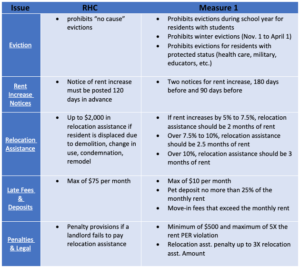Pierce County residents will vote in a general election on November 7th. One of the items on the ballot is Citizen’s Initiative Measure No. 1. If it passes, Measure 1 (also called Tacoma Landlord Fairness Code Initiative) will have a significant effect on landlord-tenant relationships. In this blog post, we will dive into the initiative and break down what it will do if it passes.
Background
The City of Tacoma passed an update to the Rental Housing Code (RHC) on July 11, 2023 which expanded tenant rights. The RHC mandates:
- new rules on rent increases and eviction notices
- tenant relocation assistance from landlord
- rules for disclosing lease info and other docs
- limits on rental fees and deposits
- changes to renter screening standards
The new amendment of the RHC was only passed 3 months ago and its effects have not been felt in Tacoma’s housing market yet. Even though Tacoma has already added significant updates to landlord-renter laws just a few months ago, we already have a new initiative on the ballot that would give renters even more leverage against housing providers.
Unintended Consequences
Although it may have been submitted and passed with good intentions (protecting vulnerable renters), the current RHC already has the potential to disrupt Tacoma’s housing market in ways that will be damaging to both housing providers and housing seekers. However, these unintended consequences can take months or years to be felt across our economy. Some of the effects of the RHC can include:
- harder to evict renters who are using drugs, leaving trash, or making unsafe environment
- increasing bankruptcies, costs, and hardships for local owner-operator housing providers
- forcing housing providers to take properties off the market
- a decrease in the supply of housing leads to an increase in price for everyone
- smaller housing providers could be forced to sell their properties to big holding companies
Measure 1
If it passes on November 7th, Measure 1 will expand the leverage that the RHC gives residents over housing providers. The Pierce County Voters Pamphlet (page 68) briefly describes the ways that Measure 1 will impact eviction, rent increases, relocation assistance, fees, deposits, and penalties.
In the following sections, we will explore each of these individual proposals in greater detail.
1. Eviction protections
Perhaps the most significant proposal in Measure 1 is a proposal on prohibiting most evictions during the school year and in the winter. Measure 1 would prohibit economic evictions for households with students or children under 18 years old. It would also prohibit evictions between November 1 and April 1. Regardless of the payment status, Measure 1 would prohibit housing providers from evicting renters that belong to protected classes, such as members of the military, seniors, first responders, health care providers, or educators. Further, it prohibits evicting family members if one of the current residents is evicted. However, these eviction prohibitions would not apply if occupancy rules were breached, the rental was being used for illegal activity, the owner or the owner’s family moves to occupy the rental, or the rental is condemned for not being habitable.
2. Rent increases and eviction notices
Under the current RHC amendment, housing providers are required to send a notice of rent increase at least 120 days before the increase can go into effect. Under Measure 1, housing providers would be required to send 2 notices, the 1st notice between 210 and 180 days before the rent increase and the 2nd notice between 120 and 90 days before the rent increase. Further, housing providers will not be able to raise rents or evict a renter if they are determined to be in violation of RCW 59.18.060 or TMC 2.01.050. The 2023 RHC amendment already prohibits housing providers from increasing rent or evicting renter if they do not have a current City annual business or rental license.
3. Relocation assistance
Although the RHC already contains provisions that provide up to $2,000 in relocation assistance in situations where the renter is displaced due to significant rehabilitation, construction, remodeling, demolition, rental repurposing, or condemnation, Measure 1 would significantly expand the burden on housing providers to pay out relocation assistance funds if a renter decides to move instead of paying increased rent. According to the ballot proposal, if the renter decides to move instead of accepting a rent increase, they can send a request for relocation assistance to the landlord at any point after receiving the notice of rent increase. The initiative would compel housing providers to pay relocation assistance within 30 days of receiving a relocation assistance request. Relocation assistance would be equal to:
- 2 months of rent if the rent increase is between 5%-7.5%
- 2.5 months of rent if the rent increase is over 7.5% and up to 10%
- 3 months of rent if the rent increase is over 10%
If a renter receives relocation assistance but then decides to stay in their rental, the renter must return the funds to the landlord. The requirement to pay relocation assistance will not apply if the landlord and renter are living in the same building if the building has four or fewer rentals, if the renter(s) have lived in the rental for less than 6 months, or if the landlord has temporarily rented out their primary residence during the landlord’s absence due to active-duty military service.
4. Fee and deposit standards
Measure 1 would prohibit late fees or charges that exceed $10 per month and pet damage deposits that exceed 25% of one month’s rent. Any fees that are not in compliance with RCW 59.18.257 are also prohibited. The initiative would also prohibit move-in fees (renter screening, processing, security deposits, rent prepayment, etc.) that exceed the first month’s rent. Further, the initiative prohibits any non-refundable fee charged at the beginning of the tenancy, such as a “holding fee” to hold the rental until the new renter can move in. Any rental agreement that requires payment of any fees prohibited by Measure 1 would be deemed void.
5. Penalties and enforcement
Measure 1 proposes strong penalties and enforcement actions for violations. Under Measure 1, renter can sue for violations and obtain actual damages, costs, reasonable and attorney fees. Housing providers would be liable for no less than $500 and up to 5 times the monthly rent per violation. If the violation is determined to be an illegal rent under the initiative, the penalty would be no less than three times the monthly rent. If the landlord fails to pay the relocation assistance amount, then the penalty is three times the relocation assistance amount. Under the initiative, renter’s rights organizations can also sue on behalf of renters.
A landlord may seek a court order exempting them from some of these penalties if they can show that the penalties would result in significant economic hardship, the penalty is preempted by federal or state law, or if the landlord can show that the penalty would result in “takings” under the Fifth Amendment.
Conclusion
If passed, Measure 1 would significantly change the renter-landlord relationship. Renters stand to gain new rights and protections at the expense of housing providers, which would have major effects on Tacoma’s housing market. We recommend all eligible voters to vote NO on Measure 1.
Article Source: Landlord Solutions


